American English Vocabulary - Letter
T
The words on this page came from the VOA, Voice of
America, Special English Word Book.
Use the Fun Easy English
dictionary
for a more detailed explanation of each word. |
- take
- v. to put a hand or hands around something and
hold it, often to move it to another place; to carry
something ; to seize; to capture; to begin to be in
control ("The president takes office tomorrow.")
- talk
- v. to express thoughts in spoken words; n. a
meeting for discussion
- tall
- ad. higher than others; opposite short
- tank
- n. a large container for holding liquids; a heavy
military vehicle with guns
- target
- n. any person or object aimed at or fired at
- taste
- v. to sense through the mouth ("The fruit tastes
sweet.")
- tax
- n. the money a person or business must pay to the
government so the government can provide services
- tea
- n. a drink made from the plant of the same name
- teach
- v. to show how to do something; to provide
knowledge; to cause to understand
- team
- n. a group organized for some purpose, often for
sports
- tear
- v. to pull apart, often by force
-
technical - ad. involving machines, processes
and materials in industry, transportation and
communications; of or about a very special kind of
subject or thing ("You need technical knowledge to
understand how this system works.")
-
technology - n. the use of scientific
knowledge and methods to produce goods and services
-
telephone - n. a device or system for sending
sounds, especially the voice, over distances
-
telescope - n. a device for making objects
that are far away appear closer and larger
-
television - n. a device that receives
electronic signals and makes them into pictures and
sounds; the system of sending pictures and sounds by
electronic signals over a distance so others can see
and hear them on a receiver
- tell
- v. to give information; to make known by speaking;
to order; to command
-
temperature - n. the measurement of heat and
cold
-
temporary - ad. lasting only a short time
- tense
- ad. having fear or concern; dangerous; opposite
calm
- term
- n. a limited period of time during which someone
does a job or carries out a responsibility ("He
served two terms in Congress."); the conditions of
an agreement that have been accepted by those
involved in it
-
terrible - ad. very bad; causing terror or
fear
-
territory - n. a large area of land
- terror
- n. extreme fear; that which causes great fear
-
terrorist - n. a person who carries out acts
of extreme violence as a protest or a way to
influence a government
- test
- v. to attempt to learn or prove what something is
like or how it will act by studying or doing ("The
scientists will test the new engine soon."); n. an
attempt to learn or prove what something is like or
how it will act by studying or doing ("The test of
the new engine takes place today."); a group of
questions or problems used to find out a person's
knowledge ("The students did well on the language
test.")
- than
- conj. connecting word used to link things that may
be similar, but are not equal ("My sister is taller
than I am.")
- thank
- v. to say that one has a good feeling toward
another because that person did something kind ("I
want to thank you for helping me.")
- that
- ad. showing the person, place or thing being
spoken about ("That man is a soldier."); pro. the
person, place or thing being spoken about ("The
building that I saw was very large.")
- the
- pro. used in front of a name word to show that it
is a person or thing that is known about or is being
spoken about
-
theater - n. a place where movies are shown
or plays are performed
- them
- pro. other people being spoken about
- then
- ad. at that time; existing; and so
- theory
- n. a possible explanation of why something exists
or how something happens using experiments or ideas,
but which is not yet proven ("Other scientists are
debating his theory about the disappearance of
dinosaurs.")
- there
- ad. in that place or position; to or toward that
place
- these
- pro. of or about the people, places or things
nearby that have been spoken about already
- they
- pro. those ones being spoken about
- thick
- ad. having a large distance between two opposite
surfaces ("The wall is two meters thick."); having
many parts close together ("The forest is very
thick."); almost solid, such as a liquid that does
not flow easily; opposite thin
- thin
- ad. having a small distance between two opposite
surfaces; not fat; not wide; opposite thick
- thing
- n. any object
- think
- v. to produce thoughts; to form ideas in the mind;
to consider; to believe
- third
- ad. coming after two others
- this
- pro. of or about the person, place or thing nearby
that has been spoken about already
-
threaten - v. to warn that one will do harm
or cause damage
-
through - prep. in at one end and out at the
other; from front to back; from top to bottom; with
the help of; by
- throw
- v. to cause to go through the air by a movement of
the arm
- tie
- v. to join or hold together with some material; n.
anything that joins or unites; links or connections
("The two nations have strong trade ties.")
- time
- n. that which is measured in minutes, hours, days
and years; a period that can be identified in hours
and minutes and is shown on a clock; a period when
an event should or will take place
- tired
- ad. having less strength because of work or
exercise; needing sleep or rest
- to
- prep. showing the direction of an action; showing
the person or place toward which an action is
directed; showing a goal or purpose
- today
- n. this day
-
together - ad. in one group; at the same time
or place; in cooperation
-
tomorrow - n. the day after today
-
tonight - n. this night
- too
- ad. also; as well as; more than is necessary
- tool
- n. any instrument or device designed to help one
do work
- top
- n. the upper edge or surface; the highest part;
the cover of something
-
torture - v. to cause severe pain; n. the act
of causing severe pain in order to harm, to punish
or to get information from
- total
- n. the complete amount
- touch
- v. to put the hand or fingers on
- toward
- prep. in the direction of; leading to
- town
- n. a center where people live, larger than a
village but not as large as a city
- trade
- v. to buy and sell or exchange products or
services; n. the activity of buying, selling or
exchanging products or services
-
tradition - n. a ceremony, activity or belief
that has existed for a long time
-
traffic - n. the movement of people, vehicles
or ships along a street, road or waterway
- tragic
- ad. extremely sad; terrible
- train
- v. to teach or learn how to do something; to
prepare for an activity; n. an engine and the cars
connected to it that move along a railroad
-
transport - v. to move goods or people from
one place to another
-
transportation - n. the act or business of
moving goods or people
- trap
- v. to catch or be caught by being tricked; to be
unable to move or escape; n. a device used to catch
animals
- travel
- v. to go from one place to another, usually for a
long distance
-
treason - n. the act of fighting against
one's own country or of helping its enemies
-
treasure - n. a large collection of money,
jewels or other things of great value
- treat
- v. to deal with; to act toward in a special way;
to try to cure
-
treatment - n. the act of treating; the use
of medicine to try to cure or make better
- treaty
- n. a written agreement between two or more nations
- tree
- n. a very tall plant that is mostly wood, except
for its leaves
- trial
- n. an examination in a court of a question or
dispute to decide if a charge is true
- tribe
- n. a group of families ruled by a common chief or
leader
- trick
- v. to cheat; to fool a person so as to get
something or make him or her do something
- trip
- n. a movement from one place to another, usually a
long distance
- troops
- n. a number of soldiers in a large controlled
group
-
trouble - n. that which causes concern, fear,
difficulty or problems
- truce
- n. a temporary halt in fighting agreed to by all
sides involved
- truck
- n. a heavy vehicle used to carry goods
- true
- ad. correct; not false
- trust
- v. to believe that someone is honest and will not
cause harm
- try
- v. to make an effort; to take court action against
a person to decide if he or she is guilty or
innocent of a crime
- tube
- n. a long, round structure through which liquids
or gases can flow; a long, thin container in which
they can be kept
- turn
- v. to change direction; to move into a different
position; to change color, form or shape
|
|
|
Additional Lessons |
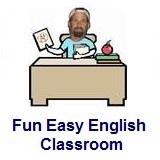 About These
Lessons About These
Lessons
The following classroom lessons are great for students
who want additional listening and reading practice. |
-
Travel America -
Beginner
Level. Do you love America and American
English? Learn before you travel. Facts and other
cool stuff about your favorite U.S. state. Great
English reading practice.
|
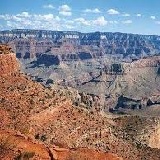 Travel
America - Virginia Travel
America - Virginia
(Beginner -
Reading)
Learn some interesting facts and read interesting
stories about Virginia. |
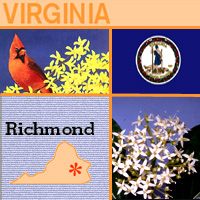 Virginia Virginia
The Virginia Company founded the first permanent
English colony at Jamestown in 1607. One of the
original 13 states (it entered the Union in 1788),
Virginia was named for Elizabeth I, the Virgin Queen
of England. Virginia holds an important place in
American history, as it was home to many of the
founding fathers, including George Washington,
Thomas Jefferson, James Madison, George Mason, and
Patrick Henry. Four of America's first five
presidents were Virginians. During the Civil War,
Richmond, Virginia's capital, was the capital of the
Confederacy. Today, Virginia is a popular tourist
spot where people can visit historic places such as
Alexandria, Williamsburg, and Mount Vernon, George
Washington's estate. Dogwood is the state flower and
the cardinal is the state bird of the "Old
Dominion." |
Virginia
State Flag
The state flag of Virginia has a deep blue field
with a circle of white in the center on both sides of the
flag. In this white circle Virginia's coat of arms is
painted or embroidered, as described by the convention of
1776 (also the description of Virginia's state seal):
"Virtus, the genius of the commonwealth, dressed like an
Amazon, resting on a spear with one hand, and holding a
sword in other, and treading on tyranny, represented by a
man prostrate, a crown fallen from his head, a broken chain
in his left hand and a scourge in his right. In the exergon
the word Virginia over the head of Virtus, and underneath
the words "Sic Semper Tyrannis." |
|
Source:
State Symbols USA |
|
|
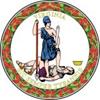 Virginia
State Facts Virginia
State Facts
Picture: state seal of Virginia |
|
State Capital |
Richmond |
|
Nickname |
Old Dominion |
|
Motto |
Sic Semper Tyrannis (Thus Always to Tyrants) |
|
Statehood |
June 25, 1788 (10th) |
|
Origin of Name |
Named for England's "Virgin Queen," Elizabeth I |
|
Largest Cities |
Virginia Beach, Norfolk, Richmond, Chesapeake,
Newport News |
|
Border States |
Kentucky, Maryland, North Carolina, Tennessee, West
Virginia |
|
Area |
39,598 sq. mi., 37th largest |
|
State Bird |
Cardinal |
|
State Flower |
Dogwood (cornus florida) |
|
State Tree |
Dogwood (cornus florida) |
|
State Song |
None |
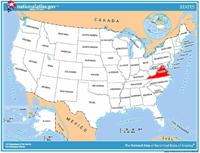 Travel
and tourism site for Virginia - This state travel and
territorial tourism site provides ideas for your vacations,
meetings, and more. Travel
and tourism site for Virginia - This state travel and
territorial tourism site provides ideas for your vacations,
meetings, and more. |
|
|
Virginia Stories |
|
|
Fiddler Henry Reed of Virginia
Have you ever heard traditional fiddle music? One well-known
fiddler, Henry Reed, grew up in Glen Lyn, Virginia. Reed was born in
1884 and grew up in a musical family. He spent most of his life
performing fiddle tunes that bring to mind the history of the
state's Appalachian frontier. Reed learned an amazing number of
tunes, most of them by ear. He knew a wide variety of melodies, such
as those from the early American frontier, waltzes, popular tunes
from the turn of the 20th century, and 19th century marches.
The style of Henry Reed's fiddle playing, like the style of other
older fiddlers in the South, is a combination of different
influences. For instance, the rhythms he used came from both
European and African American influences. American Indian music may
also have made an impact on the method of playing that Reed learned
so many years ago.
During the mid-1960s, folklorist Alan Jabbour recorded Henry Reed
performing fiddle tunes. Many of the traditional tunes Reed played
became popular again during the fiddling revival of the later 20th
century. |
|
|
Lancaster Toy and Train Collection at the
Children's Museum of Virginia
What could be more fun than a museum full of toys?
A.J. "Junie" Lancaster and his wife, Mildred, had a sizable toy and
train collection, which they wanted to share with others. So they
donated it to the Children's Museum of Virginia in Portsmouth. The
collection contains more than 2,000 toys and trains worth about $1
million! Now, young and old can enjoy Tonka toys, model cars, Buddy
L trucks, fire trucks, and tin windup and cast iron toys. The
collection also includes circus toys -- circus tents filled with
colorful circus figures, trapeze artists, and circus wagons.
The majority of the collection, however, is dedicated to model
trains. All types of trains -- Lionel, Williams, and Weaver in many
different sizes -- are on display. Visitors can pop their heads up
into a clear dome and get a 360-degree look at the trains as they
chug around the exhibit area. They can even work the trains'
controls.
Visitors also learn about railroad safety, the fun of model
railroading and collecting, the history of railroads, and the
railroads' importance to the development of the United States. |
|
|
Independence Day Celebration and
Naturalization Ceremony at Thomas Jefferson's Monticello
Every year on the Fourth of July, people from many different
countries come to Monticello, Thomas Jefferson's home, to become
United States citizens. The process of becoming a U.S. citizen is
called naturalization. After living in the U.S. for a certain number
of years, an immigrant can apply for citizenship by petitioning for
naturalization.
Thomas J. Michie, Judge of the U.S. District Court of Western
Virginia, began the Independence Day naturalization ceremonies at
Monticello in 1963. The ceremony opens with a concert of patriotic
American music. The petitioners for naturalization, their family,
friends, and guests are welcomed; an invited guest reads the
beginning of the Declaration of Independence; and a guest speaker
delivers remarks before the new citizens take an oath. After the
formal proceedings, the day ends with a Fourth of July picnic.
In 2000, the ceremonies were especially significant. The guest
speaker was Madeleine K. Albright, the secretary of state at the
time. She is not only the first female secretary of state, but also
an immigrant. Albright followed in the footsteps of Thomas Jefferson
who served as the first Secretary of State, in 1790-1793. |
|
|
Pony Swim and Auction
Can you guess how a herd of wild ponies arrived at Assateague
Island, Virginia, and how their offspring have continued to live
there for more than 300 years?
No one knows how the "ponies" got on the island, but one myth says
that they are descendants of mustangs that swam there from a
shipwrecked Spanish galleon (a large sailing ship). The most likely
explanation is that they are the descendants of horses that were
brought to the island in the late 17th century by owners on the U.S.
mainland who wanted to avoid taxes and laws requiring them to be
fenced. Although they are called "ponies," they are actually horses.
Their diet of grasses and seaweed and the harsh environment prevent
them from growing to full size, which makes them look more like
ponies.
Today, the ponies are split into two main herds -- one on the
Virginia side and one on the Maryland side of the Chincoteague
National Wildlife Refuge on Assateague Island -- and each herd has
about 150 animals. |
|
|
Fort Lee and the Legacy of Army Women
The new U.S. Army Women's Museum at Fort Lee, Virginia, honors the
women who have served in the U.S. Army.
During World War I, when Fort Lee was called Camp Lee, many women
served there as nurses. During World War II, the Women's Army
Auxiliary Corps (WAAC) was established. That name was soon changed
to the Women's Army Corps (WAC). In the beginning, the WAC was
considered a temporary unit that would be broken up when World War
II ended, but that didn't happen. Instead, the WAC Training Center
was established at Camp Lee in 1948 and women trained there before
moving on to their permanent Army assignments.
Women have served in the military since the beginning of our nation.
During the Revolutionary War, Mary McCauley, better known as "Molly
Pitcher," carried water to cool both the cannons and the soldiers in
her husband's regiment. During the Civil War, Harriet Tubman (an
escaped slave) worked as a nurse and spy for Union forces and led
the Union Army on a raid that resulted in freedom for more than 750
slaves. During World War II, Jacqueline Cochran was the first woman
to fly a heavy bomber over the Atlantic. She also trained American
women as transport pilots in England for the Air Transport Auxiliary
of the Royal Air Force. She was awarded the Distinguished Service
Medal in 1945 for her service in World War II.
The U.S. Army Women's Museum at Fort Lee highlights the bravery of
these women and many others who have served in our country's forces. |
|
|
Torpedo Factory Art Center
What can you do with an old torpedo factory? In Alexandria,
Virginia, on the banks of the Potomac River, a torpedo factory was
turned into an arts center -- the Torpedo Factory Art Center.
The factory was built after the end of the First World War, in 1918.
For the next five years submarine and aircraft torpedoes (missiles)
were produced there around the clock. After that, the building was a
storage area for arms and ammunition until World War II. After the
war it was used by the Smithsonian Institution to store art objects
and valuable dinosaur bones. Congress also stored documents there,
and the military used it to store German war films and records.
The city of Alexandria bought the factory from the federal
government in 1969, but it wasn't until 1974 that artists converted
the huge space into a complex of bright, clean studios. Today, you
can visit the Torpedo Factory and see artists at work -- a potter
making a bowl, an artist making a stained glass window, or a painter
working on a canvas.
You can also learn about torpedoes. The torpedo in the picture is on
display in the main hall. It was made at the factory in 1945 and was
painted bright green so that the Navy could see it in the water when
it was tested. |
|
|
Virginia Beach Neptune Festival
Have you ever made a sand castle? What about a sand sculpture?
At the North American Sand Sculpting Championship, sand sculpturing
is an art form. The Virginia Beach Neptune Festival, which includes
the Sand Sculpting Championship, was named after Neptune, the Roman
god of the sea. You can go to this 10-day festival and participate
in sporting competitions, arts and crafts, King Neptune's Grand
Parade, and, of course, the sand competition.
Both professionals and amateurs come to the Neptune Festival to
compete in the sand sculpting competition. They start by using water
to hold the sand together. Buckets, shovels, sprayers, wheelbarrows,
ladders, and garden tools help make the sand sculptures. Cake
cutters, pallet knives, spoons, and even melon-ballers are also
used. Natural seashore items such as shells and seaweed are used for
decorations. When the sculpture is finished you should take a photo
of your masterpiece because, before you know it, it will all be
washed away. |
|
Source:
Library of Congress |
|
 National
Forests, Parks, and Monuments of Virginia National
Forests, Parks, and Monuments of Virginia
The following is a description of national
forests, parks, and monuments in the state
of Virginia. If you plan to visit or live in
Virginia for awhile then you should
definitely plan to visit some of these
fantastic places. |
|
|
|
National Forests |
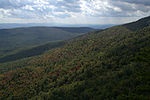 George
Washington & Jefferson George
Washington & Jefferson
In the Appalachian Mountains, the highest
point of the forest is Mount Rogers, also
the highest point in Virginia at 5,729 ft
(1,746 m) in Mount Rogers National
Recreation Area. There are 230,000 acres
(93,000 ha) of old-growth forest here, and
the Blue Ridge Parkway and Appalachian Trail
both run through the forest. This national
forest is also partially located in the
states of Kentucky and West Virginia. |
|
|
|
National Parks |
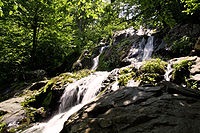 Shenandoah Shenandoah
Shenandoah's Blue Ridge Mountains are
covered by hardwood forests that teem with a
wide variety of wildlife. The Skyline Drive
and Appalachian Trail run the entire length
of this narrow park, along with more than
500 miles (800 km) of hiking trails passing
scenic overlooks and cataracts of the
Shenandoah River. |
|
|
|
National Monuments |
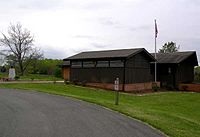 Booker
T. Washington Booker
T. Washington
The Booker T. Washington National Monument
preserves portions of the 207-acre (0.84
km2) tobacco farm on which educator and
civil rights leader Booker T. Washington was
born into slavery on April 5, 1856. The site
contains replicas of the house Washington
was born in, a smokehouse, a blacksmith
shed, a tobacco barn, and a horse barn. |
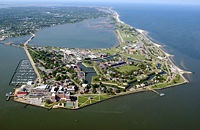 Fort
Monroe Fort
Monroe
Fort Monroe National Monument spans the
American story from the 17th to the 21st
centuries: Captain John Smith's journeys, a
haven of freedom for the enslaved during the
Civil War, and a bastion of defense for the
Chesapeake Bay. |
 George
Washington Birthplace George
Washington Birthplace
Representative of 18th-century Virginia
tobacco farms, this site is the birthplace
and boyhood environment of George
Washington. The entrance includes a Memorial
Shaft obelisk of Vermont marble that is a
one-tenth scale replica of the Washington
Monument in Washington, D.C. Also within the
monument are the historic birthplace home
area, a kitchen house, and the Washington
family burial ground. |
|
|
|
 Travel
America Travel
America
Do you love America and American English? Learn before
you travel. Facts and other cool stuff about your
favorite U.S. state. Visit the Fun Easy English Travel
America pages. Read about the beautiful National
Forests, Parks, and Monuments. Great English reading practice. |
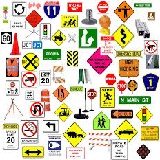 Drive America Drive America
Planning to drive in America? Learn the rules and
regulations. Great English reading practice. |
|